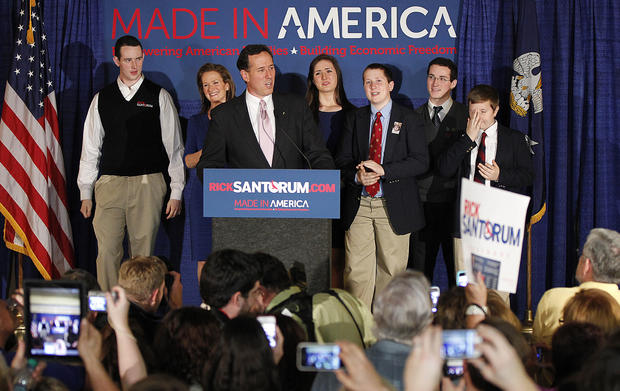How Santorum won the Alabama primary
Analysis
A Southern state win for Mitt Romney was not to be tonight: with a coalition of voters much like those that propelled him to victory in Tennessee and Oklahoma, Rick Santorum won the Alabama primary with support from conservative voters, evangelicals, lower income voters and women.
- He received strong support from evangelical voters - a group he also won overwhelmingly in Tennessee and Oklahoma. Evangelical voters made up 75 percent of primary voters in Alabama, and Santorum won 35 percent of their vote.
- Santorum also won among Alabama's most conservative voters. Among the 36 percent of voters who described themselves as very conservative, 41 percent voted for Santorum. Gingrich received 36 percent of their vote. Santorum also won among conservatives overall, who comprised two in three Alabama primary voters.
- Santorum won among women too, with 38 percent. Men chose Gingrich. Santorum has fared well with women in some recent contests, winning the women's vote in Tennessee and Oklahoma.
- Thirty-seven percent of Alabama primary voters had incomes of $50,000 or less; those voters supported Santorum too (as they have in Oklahoma, Tennessee, Ohio and Michigan).
Full Alabama results
Alabama exit poll
Alabama results by county
Mitt Romney ran well among moderates and higher income voters, groups that have supported him not only in Alabama but in other states that have held contests this year. But those groups each made up just a quarter of Alabama's voters. Romney received 42 percent of the vote among moderates, and 36 percent among those with incomes of $100,000 or more.
Many voters chose a candidate recently: 37 percent of voters said they made up their minds who to vote for in the last few days, and those late deciders split their vote between Santorum (32 percent) and Romney (33 percent).
Issues and Qualities
As has been the case in every Republican primary or caucus held this year, beating Barack Obama in November is the most important quality Alabama voters were looking for in a candidate. But when asked which candidate would be most likely to do that, 46 percent chose Mitt Romney, and just 23 percent said Santorum was best positioned to win in November.
Santorum's appeal lay elsewhere: He won a large share of support from voters who said strong moral character was most important to them (getting 62 percent of their vote), and he won among those who were looking for a true conservative (with 51 percent of those voters' support).
However, it was Newt Gingrich (40 percent), not Santorum (21 percent) or Romney (28 percent), whom voters said would best handle an international crisis. And Gingrich also led as the candidate who best understands the problems of average Americans (34 percent) - with Santorum closely following (33 percent).
Santorum sweeps Miss., Ala. primaries
Analysis: As Gingrich fades, GOP race becomes two-man fight
Santorum says results "greatly" exceeded his expectations
How Santorum won the Mississippi primary
Concerns
Alabama voters express some concerns about Romney in the exit poll. While about half of voters Romney's voters said they strongly favor him, 38 percent had reservations about him - higher than the percentage of Santorum or Gingrich voters saying the same about their candidate.
Many voters question whether Romney is truly a conservative: 50 percent of Alabama voters said that Romney's positions on the issues are not conservative enough. In contrast, 52 percent think Gingrich's positions on the issues are about right, and 53 percent said the same for Rick Santorum.
Regardless, more than four in five of Santorum's, Gingrich's or Romney's voters say they would definitely vote for the Republican nominee in November.
